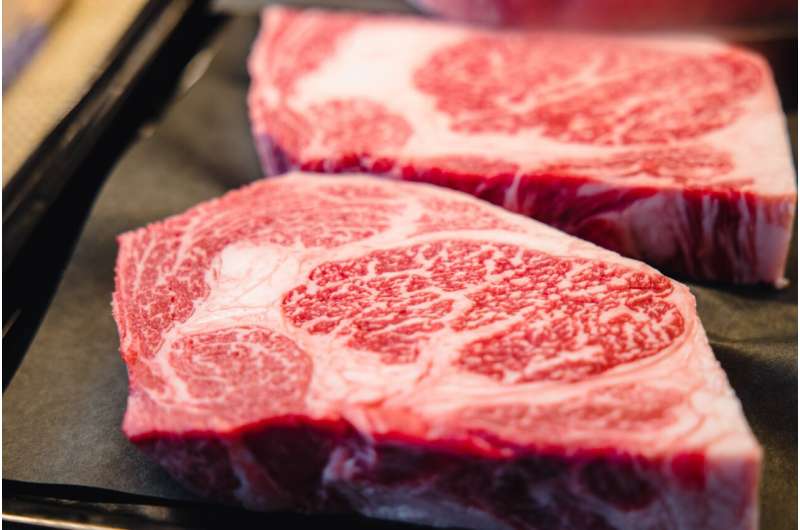
Credit: Unsplash/CC0 public domain
A new study has found that 12 percent of Americans are responsible for consuming half of the beef they consume on any given day, a finding that could help consumer groups and government agencies create educational messages about negative impacts on health and environment of beef consumption.
The 12 percent who are most likely to be men or people between the ages of 50 and 65 eat what researchers call a disproportionate amount of beef on any given day, a distinction based on the latest dietary guidelines for Americans. who suggest four ounces of meat, poultry and eggs a day combined for those consuming 2,200 calories a day.
The study, published in the journal Nutrients, analyzed data from the CDC’s National Health and Nutrition Examination Survey, which tracked the meals of more than 10,000 adults in a 24-hour period. The global food system emits 17 billion tonnes of greenhouse gases annually, equivalent to a third of all planet-warming gases produced by human activities. The beef industry is a major contributor to this, producing 8 to 10 times more emissions than chicken and over 50 times more than beans.
“We focused on beef because of its impact on the environment and because it is high in saturated fat, which is not good for your health,” said correspondent and study senior author Diego Rose, professor and nutrition program director at the Tulane University School of Public Health and Tropical Medicine.
Rose said the purpose of the study was to help target educational programs or awareness campaigns for those who eat disproportionate amounts of beef. Refining communication on the environmental impact of beef production is crucial at a time when awareness of climate change is higher than ever.
Rose said he and his fellow researchers were “surprised” that a small percentage of people are responsible for such a disproportionate consumption of beef, but whether the findings are encouraging to sustainability advocates has yet to be determined.
“On the one hand, if only 12% account for half of beef consumption, there could be big gains if you target that 12%,” Rose said. “On the other hand, that 12% may be more resistant to change.”
The study also found that those who weren’t disproportionate consumers of beef were more likely to have consulted the USDA’s MyPlate food guide system.
“This could indicate that exposure to dietary guidelines can be an effective tool for changing eating behaviors, but it could also be true that those who were aware of healthy or sustainable eating practices were also more likely to be aware of the tools dietary guidelines,” said Amelia Willits-Smith, lead author of the study and a postdoctoral researcher at the University of North Carolina at Chapel Hill.
Of the meat eaten on any given day, nearly a third came from cuts of beef such as steak or brisket. But six of the top 10 sources were mixed platters such as burgers, burritos, tacos, meatloaf or spaghetti bolognese. Some of these foods may provide an easy opportunity for disproportionate beef eaters to change their eating habits.
“If you’re getting a burrito, you could easily ask for chicken instead of beef,” Willits-Smith said.
Those younger than 29 and older than 66 were less likely to eat large amounts of beef. According to Rose, this indicates that younger generations may be more interested in mitigating the effects of climate change.
“There is hope in the younger generations, because it is their planet that they will inherit,” Rose said. “I’ve seen in my lessons that they are interested in diet, its impact on the environment and what they can do about it.”
In addition to Rose and Willits-Smith, the study authors include Tulane Clinical Assistant Professor Keelia O’Malley and Tulane Masters of Public Health graduate Harmonii Odinga.
More information:
Amelia Willits-Smith et al, Demographic and socioeconomic correlates of beef disproportionate consumption among US adults in an era of global warming, Nutrients (2023). DOI: 10.3390/nu15173795. www.mdpi.com/2072-6643/15/17/3795
Provided by Tulane University
Citation: How Only 12% of Americans Eat Half of National Beef, Creating Significant Health and Environmental Impacts (2023, Aug. 30) Retrieved Aug. 31, 2023 from https://phys.org/news/2023-08- mere-americans-nation -significant-beef.html
This document is subject to copyright. Except in any fair dealing for the purpose of private study or research, no part may be reproduced without written permission. The content is provided for informational purposes only.
#Americans #eat #nations #beef #creating #significant #health #environmental #impacts
Image Source : phys.org